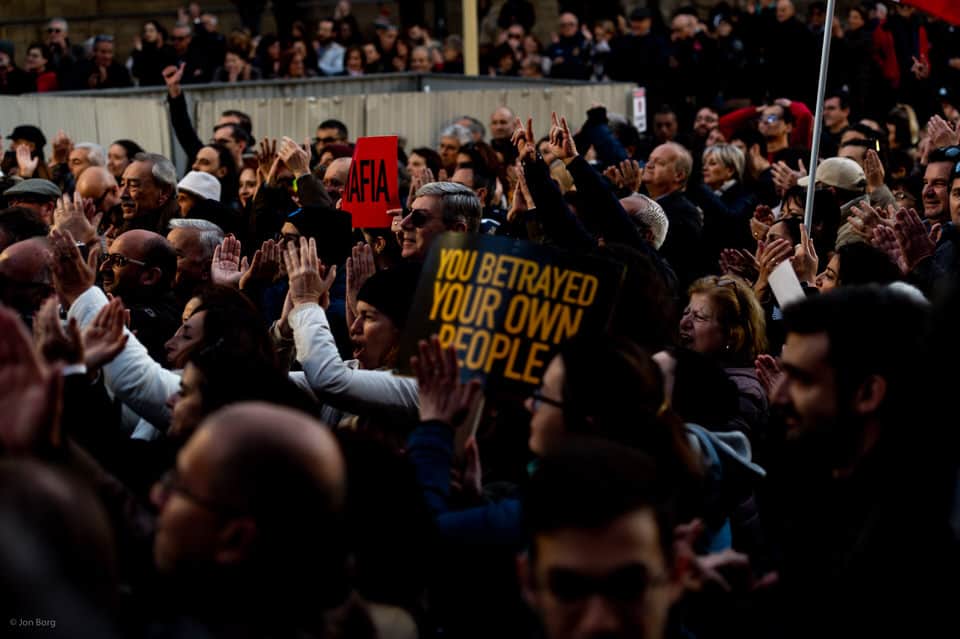
Even after the trauma of the last four years, the violence that killed Daphne Caruana Galizia, the enormity of the economic price of grey-listing, the social costs of a widening economic gap and the promise of greater tax burdens to pay for the cost of our isolation in the world … even after all that, it is impossible to expect good governance to be foremost on most people’s minds when they vote in 33 days.
These are reasons most voters will not be thinking about when they decide who to vote for and how to vote for them.
People will not vote to express condemnation of a political party whose government allowed a journalist to be killed on their watch. The fact that even now prosecutors publicly express the belief that investigators have not yet handcuffed everyone directly involved in that crime, the fact that the only conviction has been served on a button man who admitted his role in the murder in exchange for an absurdly short custodial sentence, will not be for most people a voting consideration.
Many people will not vote out of concern about the threats to free speech and the weaknesses in the structures that are supposed to be protecting journalists to ensure there are no chilling effects that prevent citizens from knowing the truth about what happens in their country.
Most people will not be mindful of the fact that after a second general election, the police have not yet acted properly on the scandals dating from Labour’s first term in office like Electrogas and the privatisation of 3 public hospitals.
Few people will express through their vote disappointment that the long-promised national debate on reforming the Constitution remains shelved and that our institutions remain largely in thrall to the government. Most people won’t be thinking of the independence of Parliament, the autonomy of the Ombudsman and other similar institutions, the independence and resourcing of the judiciary and the prosecution service, and the depoliticization of the police force, when they choose who to vote for.
Few people will look for parties that promise electoral reform, restraint of the abuse of office, and proper rules to ensure taxpayers are not made to pay for the campaign costs of the party in government.
Most people will not filter out the glitziness of a party’s campaign from the likely source of money that paid for it. Most people will not connect over-development and the destruction of our environment with the influence developers enjoy with political parties. Most people will not express a vote that insists on greater transparency in party funding, including the provision of state funding.
If you’re concerned about these things you belong to a small number of people who will have to choose a political party alongside many, many people who care about altogether different things, some of them, many of them, in contradiction with these concerns.
If you’re concerned about these issues, you’ll have to vote alongside people who want to build as they please, who want useless public sector jobs to buff up their income, who want their ministers to be able to bend the rules for them, and who only care about corruption if it feeds into their understanding of the evil of the party they oppose. You understand of course that many of people who think like this will vote for the same political party you choose for what you deem to be the right reasons.
None of this is a reason for you to either stop caring about these issues or to start deeming them irrelevant when you get to choose, or even worse, to think that since you are so lonely in your concerns that there’s no point in choosing at all.
On election day, democracy only gives you the power of your lonely vote through which to express your concerns, which is not much but it is more than any other political system would allow you to do. It is also more than anyone in the rest of democracy that disagrees with you would like to see you express.
I would remind you of two things.
The first is that if you look hard enough you will find a manifest difference between the PN and the PL in the record, and in the promises they make, on these subjects. Neither one has anything like a perfect record. But if you don’t cringe when you hear Robert Abela speak without a hint of irony that he believes his party to be the party that guarantees the rule of law there is nothing more that I can tell you that can save you from the abyss of intellectual emptiness you have fallen into. If you are offended by this, I will not lie to you and say I did not mean to cause you offence.
Linking back to the argument about an electoral system that suits the two parties at the exclusion of new ones, even there the PN’s record shows an openness to, and a legislative attempt blocked by Labour for, reform.
The second thing I would point out is that democracy does not stop on election day. The following day these issues and concerns will remain your issues and your concerns and it will remain your (and my) duty to continue to promote them and to seek to persuade enough people so that one day we might stop being so lonely all the time. We won’t just give up because Labour is re-elected, and we won’t just expect these ambitions to be realised just because the PN is elected instead. We’ll need to continue the work.
The least you can do on voting day is act in a way that is consistent with the mission you intend to pursue from the day that follows it. Go vote. And serve as best you can within the limits of the power given to you the concerns you hold so dear.